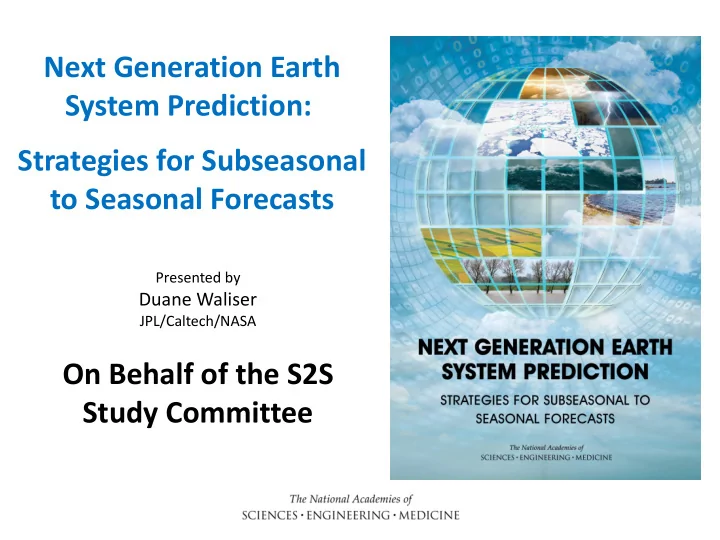

Next Generation Earth System Prediction: Strategies for Subseasonal to Seasonal Forecasts Presented by insert cover image Duane Waliser JPL/Caltech/NASA On Behalf of the S2S Study Committee
Weather, Water, and Climate Forecasts are Vital to Decision Making Businesses Governments Individuals
Forecast Timescales • Weather 0-14 Days Subseasonal • Subseasonal 2-12 Weeks to Seasonal • Seasonal 3-12 Months (S2S) • Interannual 1 year - Decade 2 weeks -12 months • Climate Decades - Centuries
What if Longer-Range Forecasts Were More Skillful and Widely Used? • Many decisions must be made in the space between weather forecasts and climate projections • Improving S2S forecasts would benefit many sectors of society • Will improve planning and preparation to help save lives, protect property, increase economic vitality
Current State of S2S Forecasting Precipitation Outlook for April–June 2016 Issued March 15, 2016 S2S forecasts are increasingly used in agriculture, energy, and water resource management—but more engagement with users in other sectors will increase use
Current State of S2S Forecasting Scientific knowledge gap, gaps in observations and modeling, and limited computational capacity currently limit accuracy of S2S forecasts Prediction Skill and Predictibility (# of Days) Estimates of predictability Indication of (i.e. upper-limit) significant of MJO room for prediction skill forecast skill Range of present- improvement day MJO forecast skill Figure 4.2 Neena et al., J. Climate, 2014
Why This Study? • Sponsored by Office of Naval Research, Heising- Simons Foundation, NASA, and NAS Arthur L. Day Fund Task: • To describe a strategy to increase the nation's capacity for S2S forecasting • To develop a 10 year scientific research agenda to accelerate progress
Committee Roster Pierre F.J. Lermusiaux, Raymond J. Ban (Chair), Ban and • • Massachusetts Institute of Associates, LLC Technology Cecilia Bitz, University of • Hai Lin, Environment Canada • Washington Laura Myers, University of Alabama Andy Brown, UK Met Office • • Julie Pullen, Stevens Institute of Eric Chassignet, Florida State • • Technology University Scott Sandgathe, University of John A. Dutton, Prescient Weather, • • Washington Ltd. Mark Shafer, The University of • Robert Hallberg , NOAA Geophysical • Oklahoma Fluid Dynamics Laboratory Duane Waliser, Jet Propulsion • Anke Kamrath , National Center for • Laboratory Atmospheric Research Chidong Zhang, University of Miami Daryl Kleist, University of Maryland, • • College Park Committee held five in-person meetings, spoke with dozens of researchers and users Report reviewed by 12 outside experts
The Committee’s Vision S2S forecasts will be as widely used a decade from now as weather forecasts are today • Fulfilling this vision will take sustained effort and investment
Fulfilling the Vision: Research Strategies 1. Engage Users 2. Increase S2S Forecast Skill 3. Improve Prediction of Disruptive Events 4. Include More Earth System Components
Example: Recommendation A • More detailed actions listed under each recommendation • Tables (S.1 and 8.1) give further guidance
Bringing It All Together • Vision and research agenda are bold • S2S forecasts will be as widely used a decade from now as weather forecasts are today • Fulfilling this vision will take sustained effort and investment
The Sub-seasonal to Seasonal (S2S) Prediction Project “Bridging the gap between weather and climate” Co-chairs: Frédéric Vitart (ECMWF) Andrew Robertson (IRI) 13
Mission Statement ● “To improve forecast skill and understanding on the sub-seasonal to seasonal timescale with special emphasis on high-impact weather events” ● “To promote the initiative’s uptake by operational centres and exploitation by the applications community” ● “To capitalize on the expertise of the weather and climate research communities to address issues of importance to the Global Framework for Climate Services” One of 3 Post-THORPEX Projects: S2S, HiW, PPP
Subseasonal Forecast Database WCRP-WWRP S2S Project S2sprediction.net International Program for S2S Research S2S Database
Daily real-time forecasts + re-forecasts • 3 weeks behind real-time • Common grid (1.5x1.5 degree) • Variables archived: about 80 variables • including ocean variables, stratospheric levels and soil moisture and temperature
S2S Project Website WCRP-WWRP S2S Project
Program Status • Initial 5 year period ends fall of 2018 • Recently conducted a user survey of how to expand/improve products, objectives, etc. • Proposal for 2 nd 5 year period being developed now. • Note
Recommend
More recommend